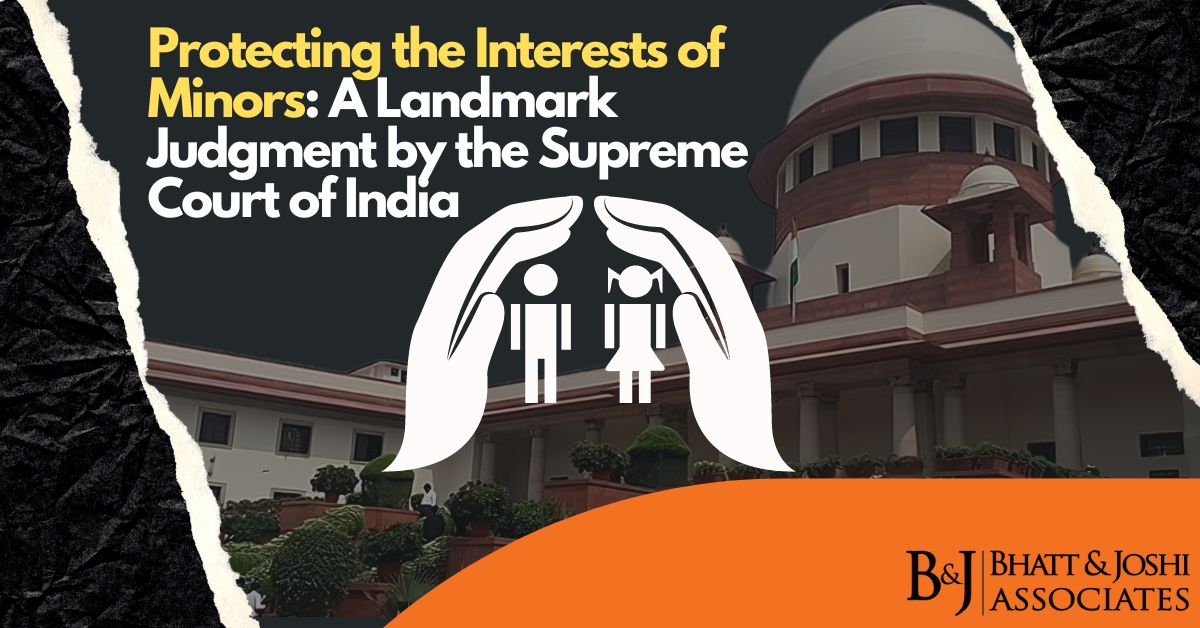
In a significant ruling that underscores the judiciary’s dedication to Protecting the Interests of Minors rights and welfare, the Supreme Court of India delivered a judgment with profound implications for cases involving the sale of minors’ properties by their guardians. This article offers a comprehensive examination of the judgment, detailing its background, legal challenges addressed, arguments presented, and wider repercussions.
The Case Overview
Participants and Jurisdiction
The dispute involved petitioner Panni Lal and respondents Rajinder Singh and another, with Justices S.P. Bharucha and M.M. Punchhi presiding over the case from the Supreme Court of India.
Background Details
Central to the dispute was a sale transaction executed by the respondents’ mother as their guardian, selling land to the appellant without obtaining the necessary legal permission, which raised significant legal questions under the Hindu Minority and Guardianship Act, 1956.
Legal Framework and Debate: Safeguarding Minors’ Interests in Legal Proceedings
Fundamental Issues and Advocacy
The crux of the legal debate revolved around interpreting Section 8 of the Hindu Minority and Guardianship Act, 1956, especially regarding the legality of selling a minor’s property without court sanction. Arguments centered on the implications of the father’s attestation of the sale deed and whether the sale was in the minors’ best interest.
Legal Analysis
The judgment was deeply anchored in a thorough review of statutory provisions and precedents, emphasizing the law’s protective intent towards minors.
- “On the Protection of Minor’s Property:” The provisions of section 8 of the Hindu Minority and Guardianship Act, 1956, are devised to fully protect the property of a minor even from the depredations of his parents. Section 8 empowers only the legal guardian to alienate a minor’s immovable property provided it is for the necessity or benefit of the minor or his estate and it further requires that such alienation shall be effected after the permission of the Court has been obtained. (See Supreme Court of India, Page 592, Paragraph G)
This passage highlights the Act’s purpose of Protecting the Interests of Minors properties, emphasizing the necessity of judicial approval for such transactions.
- “Regarding the Sale’s Validity:” It was difficult therefore to hold that the sale by reason of the fact that the mother of the minor respondents signed the sale deed and the father attested it was voidable not void. (See Supreme Court of India, Page 592, Paragraph G)
- “On the Father’s Attestation:” The attestation of the sale deed by the father showed that he was very much existent and in the picture. If he was then the sale by the mother notwithstanding the fact that the father attested it cannot be held to be sale by the father and natural guardian satisfying the requirements of section 8. (See Supreme Court of India, Page 592, Paragraph E)
These sections elucidate the court’s thorough evaluation of the guardians’ roles and the legal criteria for a scale’s validity, distinguishing between void and voidable sales in the realm of minors’ property rights.
The Judgment and Reference to Precedent
The Supreme Court dismissed the appeal, reinforcing the sale’s void status due to non-adherence to legal requirements. Notably, the judgment referenced Jijabai Vithalrao Gajre vs. Pathankhan & Ors., AIR 1971 SC 315, a pivotal case that delineated natural guardianship under Hindu Law. This precedent was instrumental in understanding the guardianship dynamics, asserting that the father is the natural guardian, followed by the mother. However, the current case was distinguished based on evidence, or the lack thereof, regarding the father’s involvement in the minors’ welfare. Therefore, the father’s attestation of the sale deed did not automatically validate the transaction under Section 8 of the Hindu Minority and Guardianship Act, 1956.
Conclusion: Upholding the Interests of Minors
This landmark judgment not only reaffirms the protective legal scaffolding surrounding minors but also clarifies the strict conditions under which guardians can act on behalf of minors in property transactions. By demarcating the boundaries of guardianship in property deals, the Supreme Court of India has bolstered the principle that minors’ welfare is paramount in legal proceedings involving their estate, ensuring their interests are vigorously defended.













